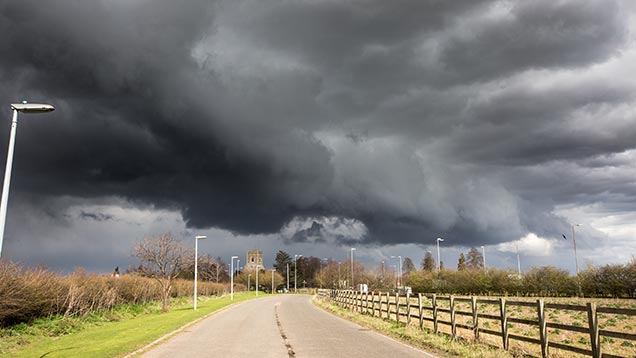Opinion: BBC dropping the Met Office is bad news for farmers
 © Geoff Robinson Photography/REX
© Geoff Robinson Photography/REX After 93 years the Met Office is losing its contract to supply the BBC with weather information. As a BBC licence fee payer I want to see value for my licence fee. But, as a farmer and self-proclaimed weather forecast addict, I want accuracy and am disappointed by a decision that smacks of cutting budgets rather than improving the dependability of our weather forecasts.
Of course the BBC should scrutinise how it spends £4bn pounds of the public’s money. I would rather they switch off the transmitter during the day and bring back that eerie test card image of a clown and a young girl playing noughts and crosses than compromise the meteorological data that Tomasz Shafernaker and Carol Kirkward so energetically present on our screens.
“The Met Office weather may not always give me the answer I want, but I definitely find it the most reliable” Ian Pigott
Cynics have suggested the shortlisted tenderers have discounted heavily to get their foot in the door. While others say that the Met Office were getting greedy and demanded too much money to provide this service.
Either way, the most confusing part of this story is that the Met Office has been told it will still be delivering weather warnings so that, in the words of one of their press team “the safety of the British public is not compromised”. So the Beeb admits it still regards the Met Office as the best forecaster.
I go weather app window shopping every morning. A wholly unscientific approach to farming, this is the process of flitting between numerous apps until you find the weather forecast that best suits your planned day. The Met Office weather may not always give me the answer I want, but I definitely find it the most reliable.
In a country so often underwhelmed by the professionalism of public service, I have never felt let down by the Met Office offering via the BBC. Don’t get me wrong, of course I get very frustrated when the sunshine they forecasted manifests itself as 15mm of rain. But I have never for one minute thought that a forecast was wrong because some meteorologist at the Met Office couldn’t be bothered or did a rush job because he or she had a bus to catch.
The UK has an incredibly complicated climate; I remember that from my geography classes at school. This makes consistent forecasting very difficult. Let’s not forget, a complicated climate isn’t “bad” for farming. Those same conditions have yielded the world wheat record this year.
What interests me most is the accuracy of the service. The lion’s share of our weather forecast is the result of complex computer algorithms analysing weather patterns, but don’t 93 years of UK weather experience count for anything?
Only last October the BBC made a huge fanfare about the £97m that the Met Office will be investing in a new “super computer”. Unveiled as the future of forecasting, the BBC proudly reported that it will forecast hour by hour up to six days into the future. The then science minister Greg Clark said about the supercomputer, “It makes us world leaders not only in talking about the weather, but forecasting it too.”
You couldn’t make it up. The Met Office is about to deliver a product infinitely better than anyone else’s and the British Broadcasting Corporation has shortlisted a company from New Zealand and another from Holland. One’s weather is determined by its mountains and the infamous Roaring Forties and the other so flat you could stand on a pallet and see from one side to the other.
Farmers livelihoods are dictated by the weather. Perhaps the suits at the BBC should have sought our counsel. There is only one way to measure the value of a weather forecasting service and that is accuracy.
Ian Pigott farms 700ha in Hertfordshire. The farm is a LEAF demonstration unit. Ian is also the founder of Open Farm Sunday
